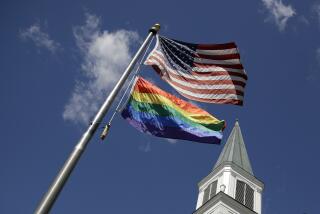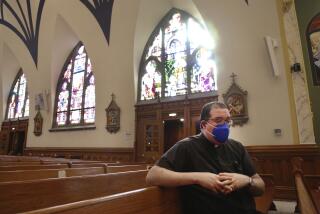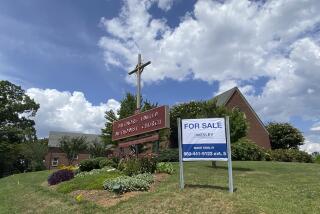Sunday School Seen as Key to Building Church Membership
- Share via
NASHVILLE — Sunday school, once belittled by Life magazine as “the most wasted hour” in the United States, is making a comeback.
Bruised by declining attendance and naysayers who labeled it as being passe, this well-rooted American tradition is now seen as the best tool to renew congregational life and reverse dwindling membership in churches, according to leaders in several mainline Protestant denominations.
“As the Sunday school goes, so goes the church,” said Warren Hartman, who studied enrollment trends while overseeing Christian education for the 8.6-million-member United Methodist denomination during some of its lean years.
Hartman says 65% or more of all members still enter the church through its classrooms. Thus, the vitality of church school is a leading indicator and a major determinant of church membership trends.
“We discovered there’s a direct correlation between the number of adults involved in Sunday school and the rate of dropouts in each congregation,” Hartman said. “Changes that usually occur first in Sunday school enrollment can show up as much as five years later in church membership totals.”
The research has slowly caught the eye of churches that are eager to shake a 40-year identity crisis and enter the next century with an effective vision.
“Negative talk about the Sunday morning classroom experience is fading,” said Bill Taylor, who is spearheading Christian education for the 15.6-million-member Southern Baptist Convention. “Across the nation, I’m seeing a renewed interest and excitement about Sunday school.”
The Southern Baptist goal is 100,000 new classes in the next five years.
“We’re not talking just about Sunday morning anymore. Bible study can be seven days a week,” Taylor noted.
United Methodists envision a broader church-school format as well, offering classes throughout the week for adults, youths and children.
“I don’t think Sunday school is so much dead as it is changing shape,” said Donna Gaither, a Christian education specialist. She cites Christian parenting classes, mentoring programs, marriage seminars and instruction on Christian disciplines such as prayer and fasting.
*
While acknowledging that Sunday school enrollment numbers have been “downright depressing,” the United Methodists’ 10-year-old Disciple Bible study program has exploded in popularity, touching hundreds of thousands of Christians worldwide, Gaither said. “These kinds of classes are feeding that whole spiritual void in America today.”
The Sunday school movement is a relatively young 216 years old.
English philanthropist Robert Raikes is generally credited as the inventor. Moved by the plight of poor children who worked in factories of Gloucester every day except Sunday, he organized the first classes in his home in 1780.
Despite early complaints of desecrating the Sabbath, the concept spread quickly to the United States for poor and frontier children. It eventually became the format for religious education for all children in the church and, in the 20th century, expanded to adults as well.
The 1950s saw phenomenal growth for churches and Sunday schools as Americans returned from World War II. Church school programming was particularly strong in the South, where adult classes also were embraced. In other regions, it remained principally a children’s activity that took place while adults attended worship.
Then came the anti-institutional 1960s. Although the U.S. population increased by about 40%, church membership and classroom enrollment took a nose dive that continued through the 1980s in most mainline Protestant denominations.
Christian educators were left scratching their heads.
Today, church leaders see Sunday school as an unfinished experiment poised to capitalize on a renewed thirst for spirituality among baby boomers.
“They have children now, many are even beginning to have grandchildren and they’re anxious for the next generation to have a religious education,” particularly since it’s gradually been sifted from public school curriculum, said Locke Bowman Jr., a recently retired professor of religious education at the Protestant Episcopal Theological Seminary in Alexandria, Va.
*
The dilemma, Bowman said, is finding teachers well-grounded in the Judeo-Christian faith.
“Sunday schools historically have relied on volunteer teachers,” he noted. “But many people today--who grew up in the ‘60s, ‘70s and ‘80s when Sunday school was out of vogue--have a hard time finding even the basic things in the Bible.”
The teaching task is complicated by the splintered nature of families and lifestyles in today’s culture.
“I taught a sixth-grade class last year and was astonished at the busy lives of these young people. It was hard for them to be quiet and have a conversation,” Bowman said.
Estelle McCarthy, professor emeritus at the Presbyterian School of Christian Education in Richmond, Va., agreed.
“Soccer is going to be the downfall of the church,” she said, only half-joking.
More to Read
Sign up for Essential California
The most important California stories and recommendations in your inbox every morning.
You may occasionally receive promotional content from the Los Angeles Times.










